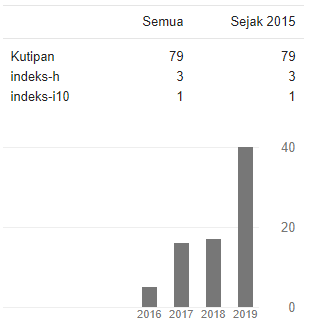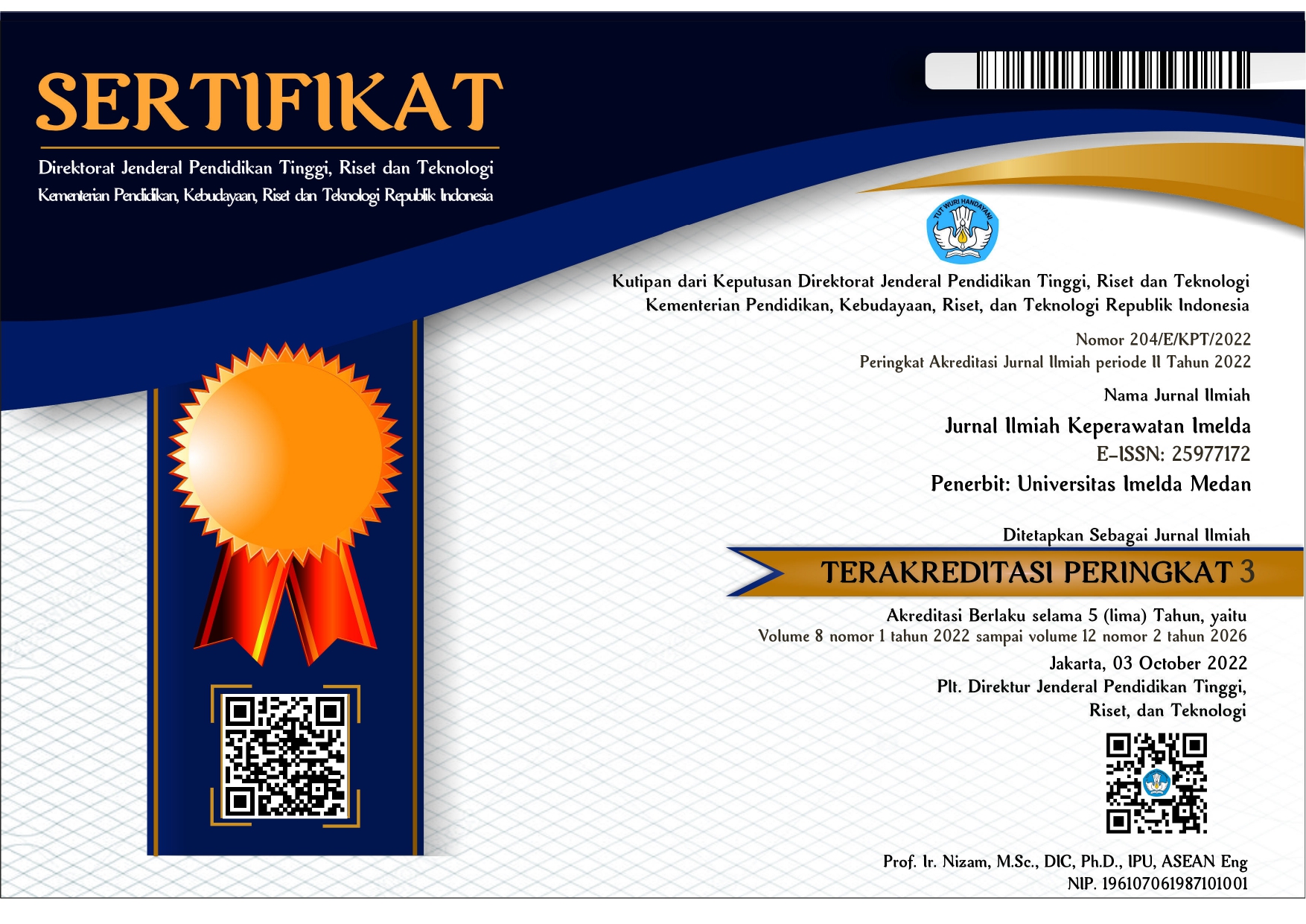PENGARUH AKTIVITAS MONTESSORI TERHADAP KEMAMPUAN KOGNITIF KLIEN PSIKOGERIATRI DENGAN SCHIZOFRENIA KRONIS
DOI:
https://doi.org/10.52943/jikeperawatan.v10i1.1323Keywords:
Montessori, Schizophrenia, MMSE, CognitiveAbstract
Elderly individuals who have been exposed to psychosis (schizophrenia) since youth or adulthood will experience severe cognitive function decline, such as memory deficits, executive function, and attention. Other cognitive functions are also affected, including language function, intelligence, and orientation. Montessori activities are activities that are tailored to the interests and skills of clients and can be applied to stimulate or prevent cognitive decline in the elderly. This study aims to determine the effect of Montessori activities on the cognitive abilities of chronic schizophrenic psychogeriatric clients. The research design is a quasi-experimental study with a non-randomized control group pre-post test design. Data collection used the MMSE (Mini Mental State Examination) questionnaire or Folstein test twice, before and after the intervention. The sample size was 30 people, divided into 15 people in the experimental group and 15 people in the control group. The research was conducted at the Laras Jiwo Psychiatric Rehabilitation Center in the Magelang Regency area from September to November 2022. The results showed that Montessori activities did not significantly affect the improvement of cognitive abilities (MMSE score), as evidenced by the Mann-Whitney test results with the difference coefficient of the posttest between the experimental and control groups obtained a z-value of -1.579 and a p-value of 0.114 (p>0.05). However, the difference coefficient between pre and post in the experimental group showed a significant difference with a z-value of -3.436 and a p-value of 0.001 (p<0.05), thus it can be concluded that Montessori activities still have an effect on improving MMSE in the experimental group.
Downloads
References
Bourgeois, M. S., Brush, J., Elliot, G., & Kelly, A. (2015). Join the Revolution: How Montessori for Aging and Dementia can Change Long-Term Care Culture. Seminars in Speech and Language, 36(3), 209–214. https://doi.org/10.1055/s-0035-1554802
Camp, C. J. (2010). Clinical investigation: Endoscopic coronary artery bypass grafting with robotic assistance. Heart Surgery Forum, 5(4), 328–333.
Chan, H. Y. lai, Yau, Y. man, Li, S. fan, Kwong, K. shi, Chong, Y. yu, Lee, I. F. kam, & Yu, D. S. fung. (2021). Effects of a culturally adapted group based Montessori based activities on engagement and affect in Chinese older people with dementia: a randomized controlled trial. BMC Geriatrics, 21(1), 1–8. https://doi.org/10.1186/s12877-020-01967-0
Chaudhry, N., Tofique, S., Husain, N., Couture, D., Glasgow, P., Husain, M., Kiran, T., Memon, R., Minhas, S., Qureshi, A., Shuber, F., & Leroi, I. (2020). Montessori intervention for individuals with dementia: feasibility study of a culturally adapted psychosocial intervention in Pakistan (MIRACLE). BJPsych Open, 6(4), 1–8. https://doi.org/10.1192/bjo.2020.49
Douglas, N., Brush, J., & Bourgeois, M. (2018). Person-Centered, Skilled Services Using a Montessori Approach for Persons with Dementia. Seminars in Speech and Language, 39(3), 223–230. https://doi.org/10.1055/s-0038-1660781
Ducak, K., Denton, M., & Elliot, G. (2018). Implementing montessori methods for dementiaTM in Ontario long-term care homes: Recreation staff and multidisciplinary consultants’ perceptions of policy and practice issues. Dementia, 17(1), 5–33. https://doi.org/10.1177/1471301215625342
Green, M. F., & Harvey, P. D. (2014). Cognition in schizophrenia: Past, present, and future Michael. Bone, 23(1), 1–7. https://doi.org/10.1016/j.scog.2014.02.001.Cognition
Hitzig, S. L., & Sheppard, C. L. (2017). Implementing Montessori Methods for Dementia: A Scoping Review. Gerontologist, 57(5), e94–e114. https://doi.org/10.1093/geront/gnw147
Keliat, B. A. (2012). Keperawatan Kesehatan Jiwa Komunitas. EGC.
Lin, L.-C., Huang, Y.-J., Watson, R., Wu, S.-C., & Lee, Y.-C. (2011). Using a Montessori method to increase eating ability for institutionalised residents with dementia: a crossover design. Journal of Clinical Nursing. https://doi.org/10.1111/j.1365-2702.2011.03858.x
Maramis. (2018). Catatan Ilmu Kedokteran Jiwa. Airlangga University Press.
Marshall, C. (2017). Montessori education: a review of the evidence base. Npj Science of Learning, 2(1), 1–9. https://doi.org/10.1038/s41539-017-0012-7
Mbakile-Mahlanza, L., Ploeg, E. S. van der, Busija, L., Camp, C., Walker, H., & O’Connor, D. W. (2019). A cluster-randomized crossover trial of Montessori activities delivered by family carers to nursing home residents with behavioral and psychological symptoms of dementia. Journal Online Psychogeriatrics. https://doi.org/10.1017/S1041610219001819
Raghuraman, S., & Tischler, V. (2021). ‘The Jigsaw Culture of Care’: A qualitative analysis of Montessori-Based programming for dementia care in the United Kingdom. Dementia, 20(8), 2876–2890. https://doi.org/10.1177/14713012211020143
Sheppard, C. L., McArthur, C., & Hitzig, S. L. (2016). A Systematic Review of Montessori-Based Activities for Persons With Dementia. Journal of the American Medical Directors Association. https://doi.org/10.1016/j.jamda.2015.10.006
Stuart, G. W. (2016). Prinsip dan Praktik Keperawatan Jiwa (2nd ed.). Elseiver.
Wilks, S. E., Boyd, P. A., Bates, S. M., Cain, D. S., & Geiger, J. R. (2019). Montessori-Based Activities Among Persons with Late-Stage Dementia: Evaluation of Mental and Behavioral Health Outcomes. Sage Journal. https://doi.org/10.1177/1471301217703242
Wu, H. S., Lin, L. C., Wu, S. C., Lin, K. N., & Liu, H. C. (2014). The effectiveness of spaced retrieval combined with Montessori-based activities in improving the eating ability of residents with dementia. Journal of Advanced Nursing. https://doi.org/10.1111/jan.12352
Xu, L., Zhang, Z., & Xu, X. (2022). Effectiveness of Montessori-based activities on agitation among Asian patients with dementia: A systematic review and meta-analysis. Medicine (United States), 101(32), E29847. https://doi.org/10.1097/MD.0000000000029847
Yosep, I. (2016). Keperawatan Jiwa. Refika Aditama.
Zhou, T., Qu, J., Sun, H., Xue, M., Shen, Y., & Liu, Y. (2021). Research Trends and Hotspots on Montessori Intervention in Patients With Dementia From 2000 to 2021: A Bibliometric Analysis. Frontiers in Psychiatry, 12(September). https://doi.org/10.3389/fpsyt.2021.737270








